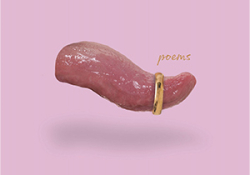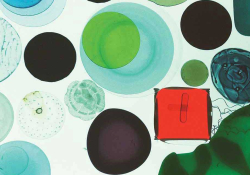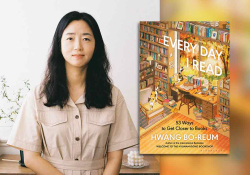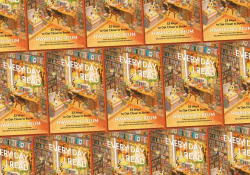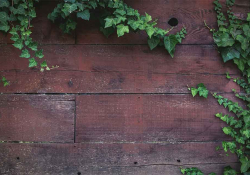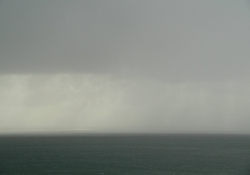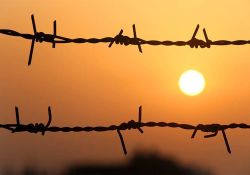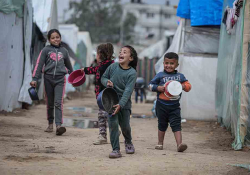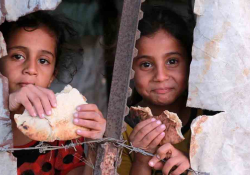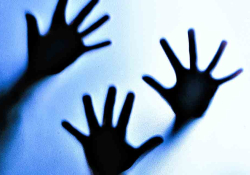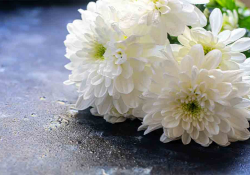Awl
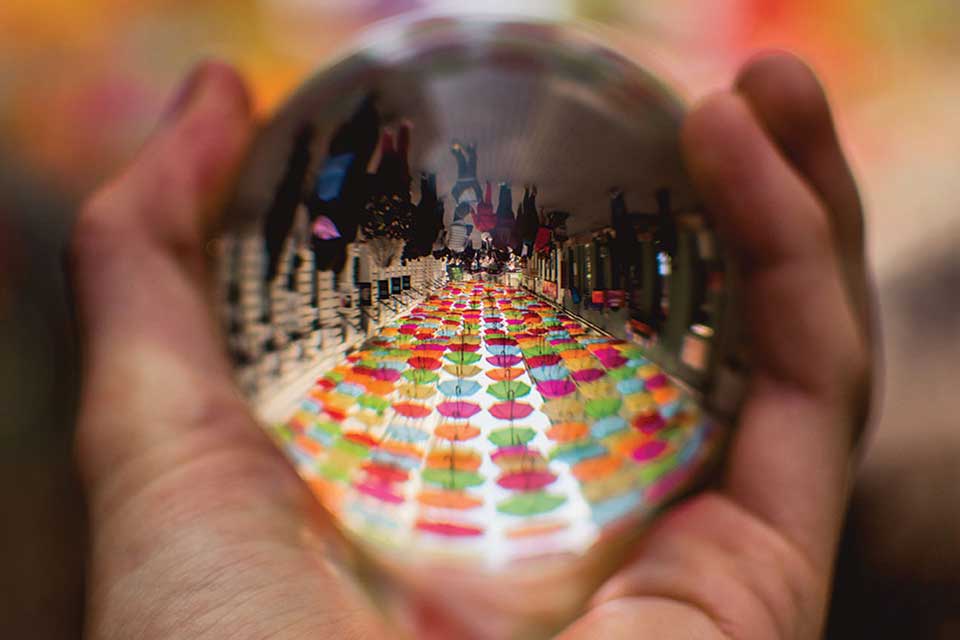
“Awl” is from a series titled “Words I Did Not Understand.” Through memory—“the first screen of nostalgia”—and language, a writer pieces together her story of home.
1
I heard a shawl for a house, a light awning made from silk or impermanent materials. I go by the sound, what it asks of the mouth when one holds it. The awl doesn’t wiggle; it adopts the mouth’s form. This is what teachers do when they discover the marvel of vowels, I tell my daughters. The vowels attach to objects, and every time those vowels come together, the object appears.
2
We are in Birmingham, pretending to tidy the house for weekend guests. The guests are real, due for arrival, but the tidying is insincere, closer to tweaking, a tiny rearranging of details. Because I love words, I love music that manhandles them with reverence. The Gregorian monks on my mom’s playlist chant words we can’t discern from the background. I listen for vowels, or the objects they fondle; those heavy, lumbering parts that want to be repeated in chorus. This is a litany, I tell my daughters. I make a hark motion with my hand.
I know litanies often go nowhere, or get stuck inside vases where women rearrange flowers to fill a hole, which may be a god that stopped speaking in complete sentences.
I know litanies often go nowhere, or get stuck inside vases where women rearrange flowers to fill a hole, which may be a god that stopped speaking in complete sentences.
The monks ah and om. I rearrange flowers around the vase’s emptiness, to make the emptiness look fuller, lusher, voluminous. This is what gods do, I tell my daughters. This is the work of saints, filling and arranging empty vessels with eye-catching significance. A god that stops speaking is senseless, or lacking senses. History is the story of how gods will do anything for attention.
3
I am in Tuscaloosa, scripting my way through high school. Like a rabbit, I read the room disguised as a forest. I track tree bark for signs of antlers. It is a skill honed by prey. The immigrant is trained to know her place as a fetish, oddball, or comic uplift for southern friends and their heritage. If anything, I am here to serve as a testimony to this nation’s incredible generosity. I thank strangers for opening doors by habit. I am naturalized into infinite gratitude for the aberrance of not being born here. Watch what you say in English, warns my mother. People can hear you.
People don’t remember the past. But they never forget when you say something that offends them. This is the unspoken obligation: every word that comes from my mouth must affirm your liberties, your hot dogs, your latest plastic fashion piece. That level of power, to determine what the vulnerable dare to say, that is your heritage.
4
I am in Bucharest. For three euros, the baba sells me a communion-maker, its wooden cross engraved with Greek letters. The magic words burned into the flesh of the tree. It is cursed, the dominant baba says. I slip it into my backpack and sidestep the ptuie-ptuie her friend leaves on the dirt near my feet. It is useless, the baba warns. If you use it to mark communion, it will be cursed. I believe her.
I am fascinated by the distance between a blessing and a curse on broken flesh. I am twenty-five and pregnant, unmarried, incubating the first bastard in my family tree. I am here for my grandmother’s funeral; to pay my respects to the woman who cared for me when my parents fled to the United States. It is a relief to be surrounded by Romanian vowels, their warm intonation, their curses and threats. I am trying to remember the girl I wanted to be.
I am fascinated by the distance between a blessing and a curse on broken flesh.
But she is never available. Remembering is not knowing; it is not a form of knowledge so much as a filmstrip. Memory is the first screen of nostalgia. Memory is a brick that gets heavier when carried. Memory is not the truth of what happened. I know this from watching adults argue over memories of what the dictator said.
The baba warns me that terrible consequences will result from letting the evil eye touch my baby. A baby is so easily ruined, she rasps. No ring on my finger. A sign of the cross to guard her from what this girl who paid money for curses might want from the scene.
Are you here for a ghost? the baba’s friend asks.
5
I am in Washington, DC, the summer-swamp of it. I am a single mother without family for hundreds of miles. I am the blankest slate in town. I am open for business. I have come to be written, to be safe in a town where no one shares the same memories with me. There is nothing to bond us beyond beer and partisan politics.
DC is a small town of unrememberings, new faces, interns, a stop along the way to bigger things. No one remembers. The veterans at the memorial remember Vietnam. I learn about war from them. I march against a war others swear won’t last longer than a month. I am obsessed with it. That war in Iraq is not over but no one remembers it exists.
Not remembering leads to paranoia, the sense that others want to take something from you, something so precious no one can say it. Histories erased bloom into conspiracy theories, an industry of moonlight and magnolias. Stories we can’t face come back to haunt us. I pay seventy-five dollars cash to an Orthodox priest to cleanse all the demons from my apartment. To make it safe for the baby. The Romanian nanny refuses to enter otherwise. She crosses herself three times and spits before stepping over the threshold.
6
I am in a hospital in Tuscaloosa. When I ask the nurse my name, she says Alina. She says I am very lucky. She says I am blessed. I am fifteen. There has been an accident. A car hit me as I crossed a street. The base of my skull has been fractured. My brain swells like yeasted bread in an oven. I don’t remember anything. Everything I knew of me keeps shifting, changing, fading.
What doesn’t change: the sound of wind rustling through dogwood skirts, the color of the sky after rain, the unplanned violet, all the inscrutable wilderness inside. And this room in my head.
7
I am rummaging through the room, trying to find things. Am I the scowling girl dressed as Virgin Mary in the nativity photo, or am I the performance of that girl you wanted from me, even then? Centuries before we could have known it was a baby. It was a boy.
The Romanian park is busy. A man in blue shoes busks with a fiddle. An older man with a cane recognizes the song and begins to sing slowly, a few notes behind. I feel as if I’m watching two movies run into each other. The older man stops singing to lean his cane against the bench. He reaches into his plastic grocery bag and removes an unopened bottle of clear liquid, which he passes to the busker. It is tuica, the old man says, his voice folding and unfolding. For your mother. May her memory be eternal. I don’t remember if the fiddler thanks him.
The babas converse behind cupped palms. One adjusts the black scarf covering her head. To get pregnant on birth control is not what God wants, the baba says. Someone must hate you. Someone must have cursed you. The baba’s friend wets her finger to count the euros. I don’t feel cursed. The only times I feel cursed are those moments when I am lying, when I am pretending, when I am faking to remember so I can feel close to you. When your eyes meet mine, I’ll agree to any gaze that doesn’t leave me alone or erased.
8
I am in New York, Boston, Arlington, Kraków. What can we know for certain? This moment may not exist. Every breath is a story that someone can steal and refashion as indictment.
I am in Birmingham, again. I may be lying but I am definitely pushing small wooden objects around on the mantle. Among them is the cursed communion-maker I’ve carried for over a decade, over the ocean of three children. I never wanted to know more about this object until a writer friend, Georgia Bellas, explains that it is a religious seal, or sfrayitha, used to stamp the prosphora, or communion bread in an Orthodox service. It is the small seal—the one with IC, XC, NIKA, or Jesus Christ Conquers.
I put my elbows into the wooden nubs of the bar counter and let the hands pouring drinks lull me into a stupor, a possible memory. That time I vomited a bottle of duty-free amaretto after going through customs. I was nineteen. It was important to buy alcohol then, in that one-month version of me. There are so many versions, though, and none is truer than the other. There is the lover, the idealistic anarchist, the mother, the bibliomaniac, the daughter, the me you remember, the me you think you know, the me in this moment at the bar, the me who will forget this moment when stranded in another. Always, the me that fears what you will do to her after I’m gone. Or how the fear that you’ll sanctify me or burn me secretly mingles with the thrill of it.
9
We are in Sohodol, a plot of land high in the Carpathian mountains. I have sprinkled my mother’s ashes in the plum orchard. I have done this so a part of her may return in the tuica a neighbor promised to harvest from her plum trees.
The first page of my notebook has a quote from an essay by Inger Christensen, “Our Story about the World”: The question is whether humans are at all able to avoid building boats, once they’ve seen a floating branch and their bodies have felt that it can bear their weight. I am forming prosphora mud pies with my hands, and stamping each one with curses for my children. It is holy dirt. It is earth. It is flesh. Take, eat, this is our body. I give thanks like a preteen mumbling rosaries in her Sunday-best voice hoping to salvation the planet with gratitude. To salvage and save and salvation are kissing cousins. This is penitence. This is poetry, the hoping, somehow, to repent for what my life demands of those who love me.
To salvage and save and salvation are kissing cousins.
This is a communion, I tell my daughters. The communion-maker sits in the grass like a virgin in unmowed hay. This will be hay after it’s cut, I tell my husband. He smiles and rubs a crab apple before biting it, and cringing. The kids sing a song and their hands turn from churches into steeples. Maybe the awl is less shawl and more a form of togetherness, I think. Maybe the awl is inside what we’ve attached to it. Maybe the awl is just the fingers that become people.
10
We are in bed. My husband wants to talk theology, the line between God and a termite. I don’t have one, I tell him. I respect the dead to keep the living from losing their place in a consumptive world.
I don’t trust words that put a lid on the fathomless.
Why don’t you want answers? he asks. I don’t trust them. I don’t trust words that put a lid on the fathomless. I know how little we get to keep. There are no flashbulbs or revelations in amnesia, only this estranging sense of déjà vu that appears in the presence of knowledge you didn’t know you possessed. I don’t know what I know, but we build this boat to carry us anyway.
11
We are in Transylvania down in the valley. We have come down from the peak. Maybe the awl is a form of togetherness, I think as we pass a tall steeple; maybe the awl is inside what we’ve attached to the tallness.
This is how the seraphim look, I tell my daughters, as we pass murals in Orthodox churches; the six-winged, many-eyed angels seem to follow us. Can you see more with six eyes? the littlest asks. The middle child has already considered this because she answers quickly, briskly, confidently: Yes, you can see other worlds and you can see through walls if you have six eyes. I need the empty parts to talk, to take their emptiness seriously, to explain the process of emptying that monks call kenosis and my son calls a void dance.
We wander past shepherds with their cell phones and bear vests and flocks of sidewalk-trotting sheep. In the village, no defense against the adoption of more vigorous money-driven cultures. The swift flex of cash, the pens powered by sales, the bell in the church square silenced by lack of interest.
We are all possessed by something, I tell my husband. Here’s your theology. We are all possessed by a story even if it means cutting myself in pieces to tell it. Even if what gets cut is your favorite part.
The girls sit at the foot of the statue and lick raspberry popsicles. They argue about pigeons, whether pigeons have souls, and the youngest says they do. She says all living creatures have souls except for sharks. Sharks are not fish and they are soulless, the youngest maintains. A pigeon pecks at her sandal. It tickles. I want to tell her what I believe, which is that souls do not exist, but if they did, sharks might still have them.
Fish travel in schools for safety. I learn from my children’s magazines the hammerhead shark is different; it is one of the few shark species that forms schools. Sharks aren’t so social. Maybe being a predator doesn’t require an awlness; one may merry the bloody path alone. But one is still understanding lonely. No one is lonelier than the Lone Ranger. As for sharks, the hammerheads school in order to mate. Let me be clearer: the females form large hammerhead schools to make it easier for the men to choose among them. The church near the statue has a golden-blue awning and the promise of awl inside.
Birmingham, Alabama

